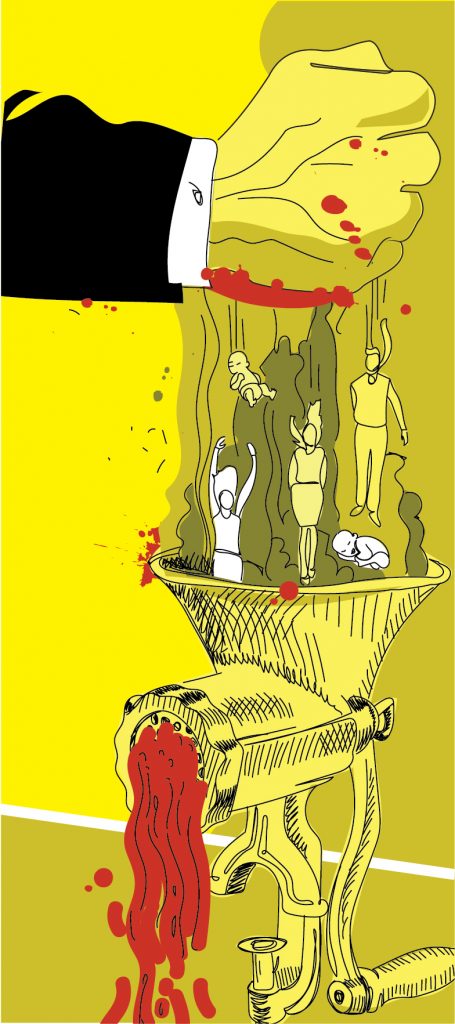In an interview with the founder of Promote Ukraine Marta Barandiy, Oleksandra Matviichuk, a prominent Ukrainian figure, shed light on various pressing topics of our time. With her unwavering commitment to human rights, Matviichuk has been at the forefront of Ukraine’s struggle since 2007, culminating in her prestigious Nobel Peace Prize in recognition of her work during Russia’s war in Ukraine from 2014 onwards.
Oleksandra championed human rights during the Euromaidan, and in 2014, she initiated and led the Euromaidan SOS.
Euromaidan SOS was a civil initiative that consisted in the fact that several thousand people were trained to provide legal and other forms of assistance to persecuted protestors.
Expanding Civil Activism in Ukraine
Oleksandra highlighted the evolution of civil activism in Ukraine, drawing a distinction between the pre-2014 and post-2014 periods. She emphasised the significant expansion of civil society and a growing sense of responsibility among individuals. People began to realise the importance of taking responsibility rather than relegating it to local or national politicians. They recognised their power to make positive changes in their communities and societies, marking a positive trend.
The Language Issue
The Ukrainian language has been suppressed for many centuries, as it is a cornerstone of Ukrainian self-identification. In discussing the current state of the Russian language in Ukraine, it’s crucial to note several points.
Firstly, one crucial aspect to consider is how the language issue has been exploited as an artificial reason for conflicts, primarily by pro-Russian political forces. A prime example is the invasion of Crimea, where the official pretext was the “defence” of the Russian-speaking population. In this scenario, language has been used as a tool to manipulate public sentiment and escalate tensions.
Secondly, it is natural for the state to develop and promote its language. The central question is how to cultivate the state language while ensuring the rights of national minorities. Ukraine has managed this balance effectively.
Back in 2014, in reality, there weren’t any significant issues surrounding the Russian language in Ukraine at the level of everyday communication between people. However, nowadays, using Russian in public places might incite misunderstandings or even aggression. This reaction is primarily rooted in the pain caused by the war. And it is the Russian language that is clearly and directly associated with the aggressor responsible for this suffering.

EU Support
Oleksandra emphasised that EU support amplifies the voice of Ukraine’s civil society. The Revolution of Dignity played a pivotal role in this process, holding symbolic significance for Ukraine. It outlined the vector of development and renewed commitment to the European integration process. For Ukraine, having an association agreement and candidate status represents significant progress. It indicates a good intermediate result and a journey towards a brighter future, thus celebrating these milestones, especially during wartime, is essential.
Impunity as a Catalyst for Conflict
Tracing the origins of the ongoing war, Matviichuk attributed the turmoil to decades of impunity that Russia enjoyed. The issue started post-WWII, as the totalitarian Soviet regime was never held accountable. This culture of impunity emboldened Russian troops to commit similar crimes in regions like Chechnya, Georgia, Syria, Libya, and now Ukraine. It’s a shared historical responsibility to break this cycle of impunity. Russia deliberately inflicts great pain on civilians in order to break the resistance and occupy the country. So we should be very clear when we document the violation of the Geneva convention – we document not just violations of international treaties, we document human suffering.
Defeat of Russia
In her closing remarks, Oleksandra conveyed a clear message: Ukraine must prevail, and Russia must face defeat. The aim is to achieve sustainable peace. According to Putin, it is a war against the “collective West,” putting all Western European countries, all democracies at high risk. Only a resounding defeat of Russia can halt this war. Alternatives, like regime change, won’t suffice because it’s not merely Putin’s battle. This war stems from the imperialist mindset ingrained in many Russians. Matviichuk believes that a decisive defeat is the only way for Russia to grasp the repercussions of its imperialistic tendencies and set the stage for meaningful reform.
Oleksandra Matviichuk’s steadfast dedication to human rights in Ukraine serves as an inspiration to activists around the world. Her insights illuminate the multifaceted challenges Ukraine faces, from linguistic disputes to the quest for lasting peace. As Ukraine strives to address these intricate complex issues, Matviichuk’s bravery and dedication shine as a symbol of hope for a brighter future anchored in justice and respect for human rights.






 UA
UA FR
FR DE
DE




